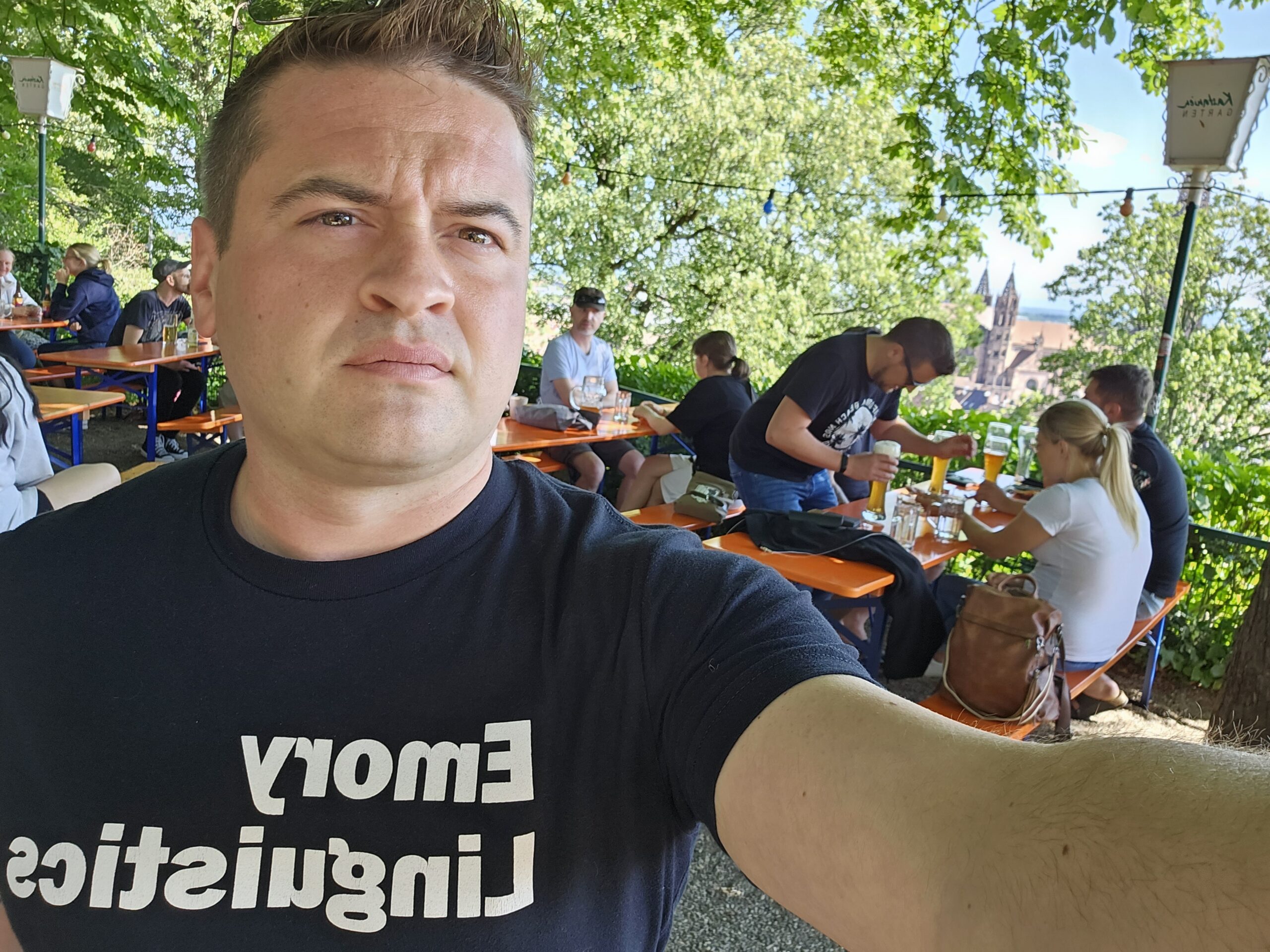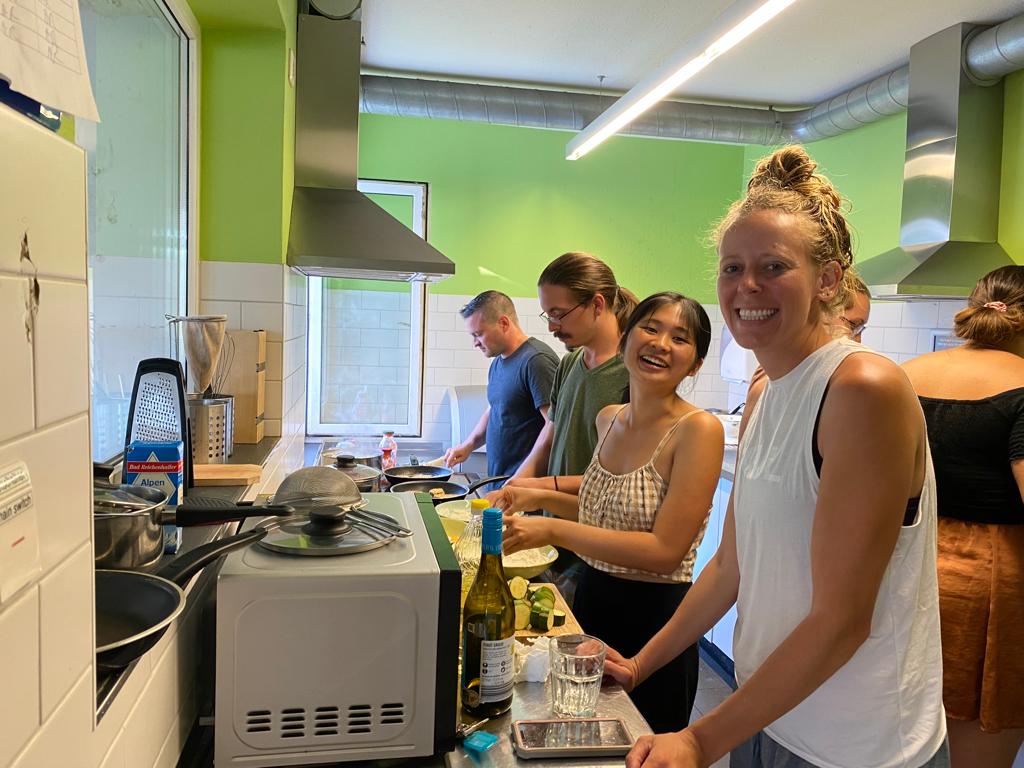teaching
My teaching philosophy stems from two important foundations; first, learning and speaking a new language opens doors to opportunities, experiences, and ways of thinking that one does not even know exist, and second, critical thinking is essential to unravel the seemingly every day or mundane, and see the complexity that underlies human activity.
I view language, along with cultural instruction, as essential to support the development of our students into global citizens. As students develop broader perspectives and diverse ways of seeing the world, they also come to see their everyday actions and context as complex constellations of societal, cultural, interpersonal, and idiosyncratic factors; each deserving of their own critical engagement. My role is to facilitate, guide, and spur on students’ individual progress towards a more nuanced understanding of the world and how they choose to interact with it.
I believe that taking a closer view of language, the symbolic tool we use to question, understand and communicate our understanding of the world to others can operate as a gateway to this type of thinking. This is true for both my German as well as linguistic course offerings. For most people, language is a means of communication, not something they regularly question. As soon as one begins to question the very tool they use for thought and interpersonal communication, something that permeates almost every waking and sleeping part of one’s day, there is no topic off the table for critical examination.
Because language influences so much of our lives and is ubiquitous in our existence as humans, language is also a great jumping off point for students to critically examine other areas of interest. Every field of human study touches language in some way, either directly as the object of study, or indirectly as the means through which we create, communicate, and comprehend other areas of study. This allows me to find a common area interest with and engage students who bring any interest to my class. By taking this approach to teaching, I find success in meeting students where they are, and helping them investigate where they might like to go.


My objectives for teaching are to:
- Enable students to become successful language learners, critical thinkers, and global citizens by utilizing evidence-based research on (language) teaching to enhance student learning outcomes, teaching students to identify, analyze, and understand patterns, and helping students learn how to ask questions, not just look for answers.
- Create learning spaces that support student growth by fostering a safe learning space, where students feel comfortable, even when engaging with difficult topics like racism, social injustices, and human rights issues, and providing space for reflection that allows students to observe their progress over larger spans of time, particularly when some learning, like language acquisition, is not apparent from one day to the next.
- Open new doors by building connections between students and the material, especially when connections between one’s personal and familial history seem disparate from what is being learned, and facilitating professional relationships to that create networks of colleagues and mentors as they move into various careers.
Below is a list of courses available at Oxford:
The German 100-level courses I teach follow the same curriculum as Emory College, which is certified as a Center of Excellence by the American Association of Teachers of German. In these first two courses, intended for students who have not previously had German, students get to explore connections between themselves and the German-speaking world that make German accessible and provide a gateway to future opportunities to study and work abroad.
The German 200-level courses were designed by me to meet the needs and interests of Oxford students and intended for students with prior experience in German. In German 201, we explore animals, the environment, and renewable energy, and this course counts towards the Sustainability minor offered through Emory University. It also carries a Continuing Communication tag, in addition to the Intercultural Communication tag.
In German 202, we explore minority and minoritized populations in Germany, beginning with current issues in the German speaking world and moving backwards in time through to the beginning of the 20th century. We also exclusively read works by authors who write in German, but learned it later in life after moving there, including Yoko Tawada, a Japanese poet who studied in Hamburg, and Rafik Schami, a Syrian immigrant who started his journey to Germany as a trained chemist and became an award-winning author who now lives in Rheinland-Pflalz.
We also strive to provide opportunities for students above the 200 level, either through directed study or a 300-level course with me, or the opportunity to take 300-level courses in a hybrid fashion with faculty at the Atlanta campus. I work closely with the Atlanta German Department faculty to ensure that students at all levels have opportunities to continue their study of German while at Oxford.
Summer Study
Students at Oxford are also welcome to join the summer program in Vienna/Freiburg with other students from across Emory. Students must first complete the 101/102 sequence and can take either 201/202 or 370A/370B during the program. I frequently teach the 370B course as co-director of the summer study program, usually with a topic focused on dialects and multilingualism in the German-speaking world. I recommend Oxford students complete the 201/202 level before participating in the summer study program because the 370A and 370B courses are taught by Emory faculty and encompass course topics that are not part of the on-campus catalog.
I highly encourage students to continue with German after they leave Oxford for a number of reasons beyond just studying abroad. These include amazing research opportunities and business internships one can only get with a background in the German language and which the German faculty at Emory will help you to apply for. You can find great information about all of these opportunities at the Emory College German Studies webpage.
German courses
As a professor and teacher of German, I often get asked why someone should learn German, or any language for that matter, when English is the dominant lingua franca in the world today. I sometimes give economic reasons, like that people who learn German make more over their lifetime than monolingual speakers, or societal reasons, like Germany has taken in more refugees than any other European country in the last fifty years and by 2030 more than half of the population will be able to claim a migrant history, or even historical reasons, like societal and cultural contributions of German scholars and the rise of the third Reich in the context of the 20th century.
All of these reasons could motivate someone to learn German. However, my driving force for teaching German is to open up my students’ world to opportunities that will change the trajectories of their lives, both personally and professionally. In my courses, I ask students to take a position of vulnerability. They are not proficient in the language I am asking them to communicate and learn in, and they must learn to navigate the world from a very different position. In doing so, I seek to push them to opening themselves up for growth by learning that their own perspectives are often narrowed by their culture’s norms and learning to communicate and think in another language requires them to open themselves to more diverse viewpoints.
Below is a list of courses available at Oxford:
This course acts as an introduction to all the subfields within linguistics and is a prerequisite for most of the 200-level courses, including LING 210 Sounds of Human Language (Phonetics and Phonology), LING 212 Structure of Human Language (Morphology and Syntax), and LING 214 Meaning in Human Language (Semantics and Pragmatics).
This is one of the core courses in the linguistics program and covers the syntax and morphology of human languages. In this course, we take a multilingual approach to understanding how words and sentences are formed in different languages and explore the different ways in which linguistic forms and structures help humans represent meaning in different ways.
This class is an elective for the major and minor, and a great course for those who are simultaneously taking a foreign language at Oxford. We explore how adults learn a second language, and the complexities that arise from learning a second or additional language when one already has a first language (or first languages). While the topic is narrow, the scope is broad, and we discuss everything from mental processes to social issues around the topic of second language acquisition.
This is a core course in the joint Psychology/Linguistics major and has been added as an elective course that fulfills requirements towards the Neuroscience and Behavioral Biology (NBB) major. The course focuses on the mental mechanisms that enable humans to learn, use, and sometimes forget language, as well as the brain regions associated with various aspects of linguistic processing. This is a great course for students with an interest in health sciences, psychology, biology, and human behavior.
My discovery seminar also carries a linguistic theme: Language change over time. In this course, students receive an introduction to the various aspects of the study of linguistics while learning about the changes that the English language underwent over the past several thousand years and how their own language has changed (and will change) over the course of their own life.
Linguistics courses
Many students who come to college have never heard of linguistics, and even those that have do not usually understand how broad our field is. I am always excited to find ways in which our students can connect language to their intended fields of study, including medicine, human health, psychology, sociology, literature, creative writing, biology, and many more. Language is something that is part of everyday life, and as such, often overlooked by many students as a field of study. By taking linguistics courses, students often discover the importance of taking a critical look at one of the most important cultural tools for human interaction.
Together with my other linguistics colleagues at Oxford, we have built a strong program that covers a significant amount of the coursework required of students who intend to major or minor in one of the linguistic programs offered at Emory.
Linguistics at Emory
I work closely with the other faculty at Emory College to ensure a smooth transition between Oxford and Atlanta. More information about the various majors and minors, and other opportunities to do research and study abroad can be found on the Linguistics Program website.